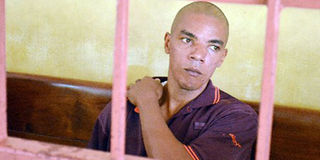The Jermaine Grant case and fight against terrorism

Jermaine Grant, a terrorist. The Mombasa High Court found him guilty on nine counts related to his attempt to procure fraudulent registration as a Kenyan citizen. PHOTO | KEVIN ODIT | NATION MEDIA GROUP
What you need to know:
- It represents a notable achievement in Kenya’s counter-terrorism efforts to use the rule of law to protect lives, our democracy, and our peaceful co-existence.
- Jermaine Grant is an explosives expert who was part of the Al- Qaeda group in Al-Shabaab that included foreign fighters aligned to the late Harun Fazul and the late Saleh Nabhan.
- The Mombasa High Court found him guilty on nine counts related to his attempt to procure fraudulent registration as a Kenyan citizen.
The recent conviction of Jermaine John Grant to nine years in prison by the Mombasa High Court is the first of a terror suspect under the Security Laws (Amendment) Act 2014.
It represents a notable achievement in Kenya’s counter-terrorism efforts to use the rule of law to protect lives, our democracy, and our peaceful co-existence.
Previously, a weak counter-terrorism legal framework hampered security efforts and failed to keep up with the steps democracies worldwide have taken to strengthen their ability to successfully prosecute terrorists and violent extremists.
Every Kenyan should be aware of Grant’s case and his mission to maim innocent Kenyans as part of an ongoing global campaign to utilise terrorist tactics if we are to collectively secure our nation.
Jermaine Grant is an explosives expert who was part of the Al- Qaeda group in Al-Shabaab that included foreign fighters aligned to the late Harun Fazul and the late Saleh Nabhan.
He was first arrested in May 2008 on the way to Somalia, and was remanded at Dadajibula police post in Garissa County.
Unfortunately, he was freed by Al-Shabaab gunmen and taken to Somalia for further training.
He returned to Kenya in August 2011 posing as a Canadian national, and was planning to carry out Al- Qaeda-sanctioned terrorist attacks.
Using fraudulently obtained documents, he unsuccessfully tried to apply for a Kenyan identification card.
Police arrested him, alongside Fuad Abubakar Manswab, a Kenyan, on December 19, 2011 in Mombasa in possession of chemicals used for making explosives.
INSUFFICIENT EVIDENCE
The police seized the bomb-making materials in his rented apartment that were similar to those used for the July 7, 2005 bombings of the public transport system in London that killed 52 civilians and injured hundreds more.
That Grant was part of the London plot starkly illustrates the borderless nature of the threat.
Jermaine Grant was charged alongside Manswab.
The latter was released on a Sh20 million bond secured by the late Abubakar Sharrif commonly known as Abu Makaburi. He jumped bail and fled to Somalia in 2013.
In December 2011, Grant pleaded guilty to charges of being in the country illegally and lying about his nationality for which he was sentenced to two years in jail.
Further charges were later brought against him.
But the Resident Magistrate of Shanzu Law Court acquitted him on January 28, 2015.
The magistrate argued that there was not enough evidence to convict Grant on the nine charges that included making a false statement for registration of birth and procuring execution of a document by false pretence.
The Security Laws (Amendment) Act 2014 (SLAA) made it possible for the Director of Public Prosecutions to appeal the acquittal since it allows the first appellate court to re-evaluate evidence and substitute the finding of the lower court with either conviction or acquittal.
Prior to the SLAA, the High Court could only substitute a conviction with acquittal and grant declaration that a lower court should have convicted without rectifying any errors committed by the latter.
EVERYONE INVOLVED
The Mombasa High Court found him guilty on nine counts related to his attempt to procure fraudulent registration as a Kenyan citizen.
Even as he goes to serve his nine-year imprisonment, Grant is facing further charges for his attempt to improvise an explosive device.
Grant and his ilk are not expressing a legitimate political aspiration that can be bargained with.
They are not killing children and innocent people by the thousands in response to their oppression or marginalisation.
After all, why would you kill the innocent to protest any injustice real or perceived?
The Grant case reveals why corruption is a national security threat.
Terrorist operatives continue to seek legal cover using forged documentation or by paying bribes to acquire the genuine item.
The SLAA law provides harsh penalties for any officials, and indeed all Kenyans, who use their offices to advance these aims.
The case also demonstrates that terrorists hide among us.
Landlords, employers, transporters should be on the lookout for suspicious transactions and excessive secrecy, and should report these immediately.
The SLAA has given the counter-terrorism community in Kenya extra tools to protect Kenyans.
More convictions will come as the Judiciary and the investigatory and prosecutorial arms increase their effectiveness and determination to be frontline defenders of Kenya.
Our agencies are co-ordinating better and engaging citizens more to empower all of us to play a part in defending our country, our communities, and our families.




